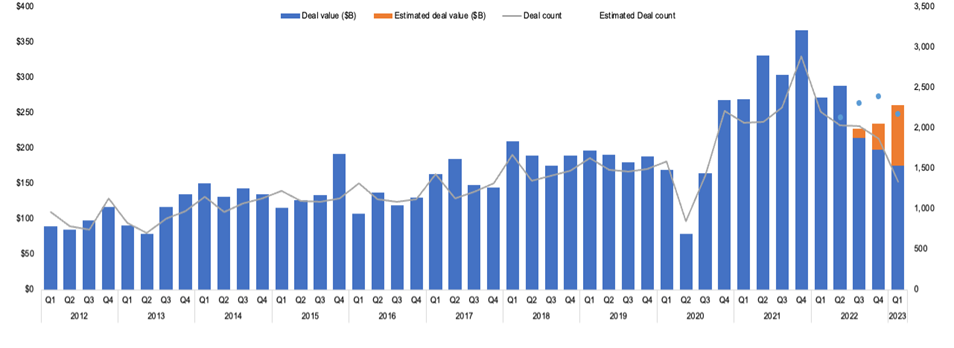Every owner and CEO who is considering preparing their business for sale keeps a close eye on the M&A market and wants to understand what is happening to valuations in the M&A market. We need to understand the impact of uncertainty and how it impacts your market and your business.
1. Uncertainty Abounds, and Uncertainty Lowers Valuations.
Are we in a recession, or is one inevitable in the near future? What happens if the US debt rating is downgraded following the contentious debt ceiling debate? Will the war in Ukraine continue? Will the Fed overreact as they focus on raising rates to combat inflation and contribute to a recession? Will there be a soft landing? Will China decide the time has come to invade Taiwan? Will the polarity between right-wing Republicans and left-wing Democrats stymie any efforts for constructive legislation? Has the Supreme Court swung too far to the right? In the face of all this uncertainty, what is happening to valuations in the M&A market? Predictably, they’re down.
2. Deals Are Still Getting Done. But at Lower Valuations.
While deals are still getting done, and yes, private equity is sitting on an uninvested trillion dollars in dry powder, everyone is proceeding with greater caution. High flying tech companies that might have traded at 10-15 times revenue are facing lower valuations. Perhaps only 8- or 10-times revenue. Unless they’re in AI, in which case valuations may still be frothy. Basic manufacturing, distribution and service companies that might have traded at 8 times EBITDA are being discounted by 1 or 2 turns or more to 5-6 times EBITDA. But deals are still getting done.
As shown in the graph from Pitchbook on the following page, while deal volume and valuations are below the high-water marks from 2021 and 2022, deals are still getting done at values and volumes that exceed prior years before 2021.
3. Fundamental Characteristics of Valuation Still Weigh Heavily in Determining Value.
If you’ve built a solid foundation, the market will reward you accordingly. Ask yourself, does your company have:
-
- Consistent growth rates in revenue and margins?
- A strong management team focused on the strategic competency of their business?
- An organization that won’t suffer from your departure?
- A culture that attracts and retains quality employees?
- A balance sheet that isn’t over leveraged and can weather short-term disruptions?
- A leading market share and defensible brand reputation?
- A defensible competitive position and understanding of competitive advantages?
If your business scores well on the fundamentals and you are considering selling your business, you’ll have to accept the fact that multiples are lower, and terms are more stringent. This may be reflected in deals that include some form of deferred payment such as an earnout, or a request that the seller retain some equity in the new entity. And you may have to commit to a longer transitional role than you initially contemplated.
In conclusion, transactions are still getting done and buyers are still active. But multiples are lower, and the fundamentals of your business and your ability to convey the strengths of your company will drive valuation. The need for a strong M&A business advisor to help you position your business for the best possible outcome has never been more important.

